| Year | Design | Description | Designer & Sculptor |
|---|
| 1997 | 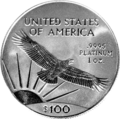 | Soaring Eagle Above America [1] | Thomas D. Rogers [11] |
| 1998 |  | Bald eagle flying over New England and rocky beach town with light house; full moon in sky |
| 1999 |  | Bald eagle flying above Southeastern Wetlands and alligator crawling in a swamp | Al Maletsky [11] |
| 2000 |  | Bald eagle flying above Midwestern field, barn and house |
| 2001 |  | Bald eagle flying above giant Saguaro cacti of the Southwest (specifically Arizona) | Thomas D. Rogers [11] |
| 2002 | 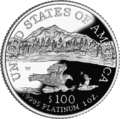 | Swooping bald eagle and a lake bordered by snowcapped mountains and trees in the Northwestern US | Al Maletsky [11] |
| 2003 | 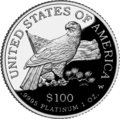 | Bald eagle perched on a Rocky Mountain pine branch against a backdrop of the United States Flag | Al Maletsky |
| 2004 | 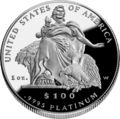 | Engraving inspired by the Daniel Chester French sculpture titled America outside the U.S. Customs House in New York City. | Donna Weaver |
| 2005 |  | American bald eagle perched on a heraldic shield with symbols representing America's strength and beauty |
| 2006 | | "Legislative Muse" flanked by two eagles perched on columns representing the bicameral legislature of the United States Congress | Designer: Joel Iskowitz
Sculptor: Don Everhart |
| 2007 | | American bald eagle representing the Executive Branch | Designer: Tom Cleveland
Sculptor: Phebe Hemphill |
| 2008 | | "Lady Justice" watched over by an American bald eagle representing the Judicial Branch | Designer: Joel Iskowitz
Sculptor: Charles Vickers |
| 2009 | | To Form a More Perfect Union "Four faces representing the diversity of our Nation, with the clothing and hair weaving together symbolizing the principle" [16] | Designer: Susan Gamble
Sculptor: Phebe Hemphill [16] |
| 2010 | | To Establish Justice "A blindfolded justice–symbolizing impartiality–holding traditional scales and carrying a branch of laurel" [17] | Designer: Donna Weaver
Sculptor: Phebe Hemphill [17] |
| 2011 | | To Insure Domestic Tranquility "Harvest goddess emerging from a field of wheat, symbolizing the vastness of our Nation and its wide diversity of views. She bears a a[ sic ] stalk of wheat in her left hand, as she extends her right hand to a landing dove, representing the fulfillment of tranquility in our Nation's cohesive yet free society" [18] | Designer: Joel Iskowitz
Sculptor: Phebe Hemphill [18] |
| 2012 | 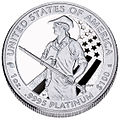 | To Provide for the Common Defence "A vigilant minuteman from the Revolutionary War, representing the protection and defense of the country during its early days. The minuteman carries a rifle and a book, which symbolizes the importance of knowledge in defending our Nation" [19] | Designer: Barbara Fox
Sculptor: Charles L. Vickers [19] |
| 2013 | | To Promote General Welfare "Young America against a backdrop of interlocking gears, symbolizing the interconnection of power between the states and the national government" [20] | Designer: Joel Iskowitz [20] |
| 2014 | | To Secure the Blessings of Liberty to Ourselves and our Posterity "Young Lady Liberty carrying her torch, symbolizing the hope and promise of America" [21] | Designer: Susan Gamble
Sculptor: Joseph Menna [21] |
| 2015 | | Liberty Nurtures Freedom "Liberty and an American bald eagle, representing Freedom. The earth and sun with rays are in the foreground" [14] | Designer: Joel Iskowitz
Sculptor: Phebe Hemphill [14] |
| 2016 | | "Liberty holding a torch of enlightenment in her right hand and an olive branch in her left to symbolize peace. The olives represent the Thirteen Original Colonies. A bald eagle with its wings outstretched appears beside Liberty" [22] | Designer: Paul C. Balan
Sculptor: Joseph Menna [22] |
| 2017 |  | Soaring Eagle Above America 20th Anniversary Commemorative [23] | Thomas D. Rogers [11] |
| 2018 | | Life "Lady Liberty planting seeds for future sustenance, lighting the way westward, and harvesting the well-worked crops" [2] | Designer: Justin Kunz
Sculptor: Phebe Hemphill [2] |
| 2019 | | Liberty "Lady Liberty keeping watch over prairies, lakes, and mountains as pioneers head westward" [24] | Designer: Justin Kunz
Sculptor: Joseph Menna [24] |
| 2020 | | Pursuit of Happiness "Lady Liberty plants seeds for future sustenance, lighting the way westward, and harvesting the well-worked crops." [25] | |
| 2021 | | Freedom of Religion "The obverse (heads) design depicts a seedling and an acorn surrounded by the inscription WITH FREEDOM OF RELIGION LIBERTY GROWS." [26] | |
| 2022 | | Freedom of Speech "The obverse (heads) design features a juvenile oak tree framed with the inscription WITH FREEDOM OF SPEECH LIBERTY BLOSSOMS." [27] | |
| 2023 | | Freedom of the Press "The obverse (heads) design portrays the branch of mature oak tree with acorns amidst the inscription WITH FREEDOM OF THE PRESS LIBERTY BEARS FRUIT." [28] | |
| 2024 | | Right to Assemble "The obverse (heads) design showcases several types of oak leaves assembled between the inscription WITH THE RIGHT TO ASSEMBLE LIBERTY SPREADS." [29] | |
| 2025 | | Right to Petition "The obverse (heads) design features a mature, spreading, impressive oak tree between the inscription WITH THE RIGHT TO PETITION LIBERTY ENDURES. The oak, known for its strength, can live up to 200 years and is a symbol of endurance." [30] | |













